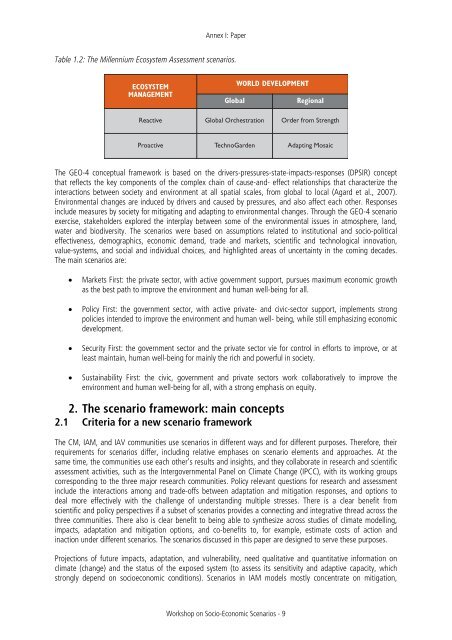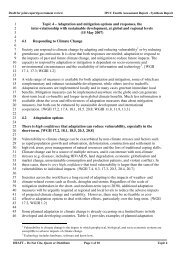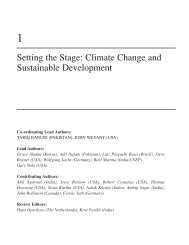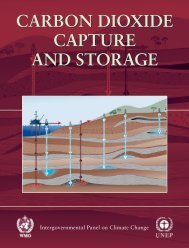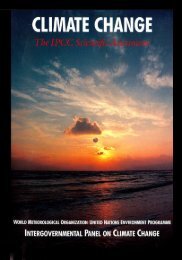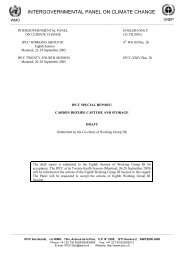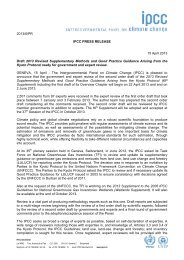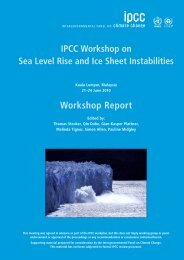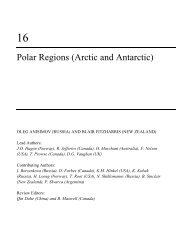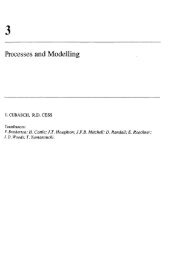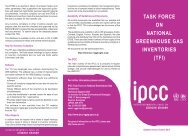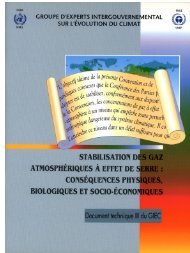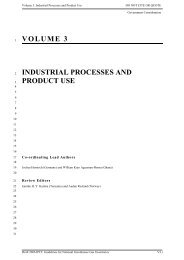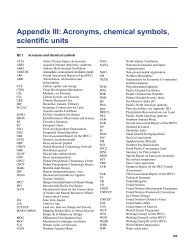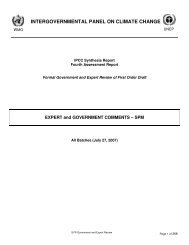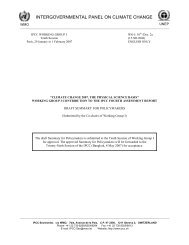Workshop Report - IPCC
Workshop Report - IPCC
Workshop Report - IPCC
Create successful ePaper yourself
Turn your PDF publications into a flip-book with our unique Google optimized e-Paper software.
Annex I: Paper<br />
Table 1.2: The Millennium Ecosystem Assessment scenarios.<br />
The GEO-4 conceptual framework is based on the drivers-pressures-state-impacts-responses (DPSIR) concept<br />
that reflects the key components of the complex chain of cause-and- effect relationships that characterize the<br />
interactions between society and environment at all spatial scales, from global to local (Agard et al., 2007).<br />
Environmental changes are induced by drivers and caused by pressures, and also affect each other. Responses<br />
include measures by society for mitigating and adapting to environmental changes. Through the GEO-4 scenario<br />
exercise, stakeholders explored the interplay between some of the environmental issues in atmosphere, land,<br />
water and biodiversity. The scenarios were based on assumptions related to institutional and socio-political<br />
effectiveness, demographics, economic demand, trade and markets, scientific and technological innovation,<br />
value-systems, and social and individual choices, and highlighted areas of uncertainty in the coming decades.<br />
The main scenarios are:<br />
<br />
<br />
<br />
<br />
Markets First: the private sector, with active government support, pursues maximum economic growth<br />
as the best path to improve the environment and human well-being for all.<br />
Policy First: the government sector, with active private- and civic-sector support, implements strong<br />
policies intended to improve the environment and human well- being, while still emphasizing economic<br />
development.<br />
Security First: the government sector and the private sector vie for control in efforts to improve, or at<br />
least maintain, human well-being for mainly the rich and powerful in society.<br />
Sustainability First: the civic, government and private sectors work collaboratively to improve the<br />
environment and human well-being for all, with a strong emphasis on equity.<br />
2. The scenario framework: main concepts<br />
2.1 Criteria for a new scenario framework<br />
The CM, IAM, and IAV communities use scenarios in different ways and for different purposes. Therefore, their<br />
requirements for scenarios differ, including relative emphases on scenario elements and approaches. At the<br />
same time, the communities use each other’s results and insights, and they collaborate in research and scientific<br />
assessment activities, such as the Intergovernmental Panel on Climate Change (<strong>IPCC</strong>), with its working groups<br />
corresponding to the three major research communities. Policy relevant questions for research and assessment<br />
include the interactions among and trade-offs between adaptation and mitigation responses, and options to<br />
deal more effectively with the challenge of understanding multiple stresses. There is a clear benefit from<br />
scientific and policy perspectives if a subset of scenarios provides a connecting and integrative thread across the<br />
three communities. There also is clear benefit to being able to synthesize across studies of climate modelling,<br />
impacts, adaptation and mitigation options, and co-benefits to, for example, estimate costs of action and<br />
inaction under different scenarios. The scenarios discussed in this paper are designed to serve these purposes.<br />
Projections of future impacts, adaptation, and vulnerability, need qualitative and quantitative information on<br />
climate (change) and the status of the exposed system (to assess its sensitivity and adaptive capacity, which<br />
strongly depend on socioeconomic conditions). Scenarios in IAM models mostly concentrate on mitigation,<br />
<strong>Workshop</strong> on Socio-Economic Scenarios - 9


